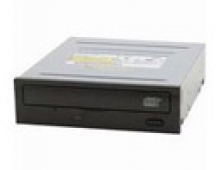
HP ready to embrace DVD+RW
HP will begin phasing out off-the-shelf CD-RW (CD-rewriteable) drives as the company begins a shift toward more expensive and possibly more lucrative recordable DVD drives. HP aggressively pursued CD-RW technology from the beginning and has profited as consumers scooped up PCs that can help write data onto disks. HP's leading presence in the CD-RW market, however, was not enough for it to continue sales of external and internal CD-RW drives.
By the early part of next year, HP expects to phase out off-the-shelf sales of all its external and internal CD-RW drives, but it will continue to make CD-RW drives available in its Pavilion desktops. In the place of CD-RW, the company will instead push its DVD+RW drives, available starting in a few days and priced at US$599, according to HP.
"With some of the traditional low-cost manufactures such as Samsung and others getting more aggressive in the market, margins are really going down on CD-RW, and demand has dropped quite a bit too," said Wolfgang Schlichting, research manager for removable storage at International Data Corp. "It's not as profitable of a business for HP as it used to be."
Consumer demand, not cost, is pushing the move, as users are always looking for the next best technology, according to HP.
"It is very clear that our customers are ready to move on to new technologies," said John Spofford, vice president and general manager of consumer entertainment solutions at HP.
HP will release a DVD+RW drive in the "next few days" that can be purchased for $599, Spofford said. The company then plans to launch a Pavilion with the drive built-in by year's end.
Although consumers were somewhat reluctant to adopt CD-RW at first, users appear ready to embrace a technology that will allow them to put content such as home movies on a DVD.
"We are already over the hump of conceptually understating what writing to optical media means," Spofford said. "What DVD+RW brings is the ability to write video, and people are ready for that."
Unlike home movies stored on tapes, which degrade in about 15 years, videos stored on a DVD will last from 80 years to 100 years, Spofford said.
"With some of the traditional low-cost manufactures such as Samsung and others getting more aggressive in the market, margins are really going down on CD-RW, and demand has dropped quite a bit too," said Wolfgang Schlichting, research manager for removable storage at International Data Corp. "It's not as profitable of a business for HP as it used to be."
Consumer demand, not cost, is pushing the move, as users are always looking for the next best technology, according to HP.
"It is very clear that our customers are ready to move on to new technologies," said John Spofford, vice president and general manager of consumer entertainment solutions at HP.
HP will release a DVD+RW drive in the "next few days" that can be purchased for $599, Spofford said. The company then plans to launch a Pavilion with the drive built-in by year's end.
Although consumers were somewhat reluctant to adopt CD-RW at first, users appear ready to embrace a technology that will allow them to put content such as home movies on a DVD.
"We are already over the hump of conceptually understating what writing to optical media means," Spofford said. "What DVD+RW brings is the ability to write video, and people are ready for that."
Unlike home movies stored on tapes, which degrade in about 15 years, videos stored on a DVD will last from 80 years to 100 years, Spofford said.




















